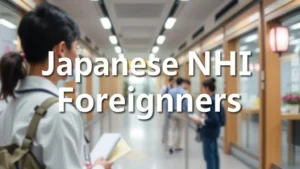Korean National Health Insurance for Foreigners: A Complete Expat Guide
Navigating healthcare abroad can feel like decoding a secret language. You’re not alone if you’ve been Googling “Korean national health insurance for foreigners” and still feel dizzy. Interestingly enough, South Jeolla Province saw an 18.5% increase in foreign residents in 2024—and most of them had one big question: how to get affordable care? (Source: Korea Times). In this guide, you’ll learn who qualifies, how to enroll, what’s covered, and how to slash costs by up to 70%. Ready to stress less about medical bills? Let’s dive in.
Table of Contents
What Is Korean National Health Insurance?
Here’s the thing: Korea’s National Health Insurance Service (NHIS) is a single-payer system that pools risk. Why does it matter to you? Because it makes hospital visits and prescriptions far more affordable than private plans—especially if you’re here long-term. Think of it as a community safety net where everyone chips in.
Enrollment is mandatory for most foreigners staying over six months as of 2025. Without it, you might pay full price—often 5–10 times higher. Plus, language barriers can turn a simple check-up into an ordeal. Thankfully, NHIS enrollees enjoy preventive health screenings, maternity benefits, and even rehabilitation services.
“Most foreign residents staying longer than six months must enroll in NHIS as of 2025,” – National Health Insurance Service
Actionable Takeaway: Check your visa duration and employer’s benefits. If you’re over six months, start gathering documents now.
Eligibility for Korean National Health Insurance for Foreigners
Ever wondered if your visa type matters? Spoiler: it does. Eligibility depends on your status—student, work, family, or another long-term visa.
Context: Why fuss over eligibility? Because enrolling too late can cost you thousands. You might even face penalties.
Detailed Explanation:
- Visa Categories: Work (E-series), Student (D-series), Family (F-series), and permanent residents (F-5) must enroll.
- Six-Month Rule: If your intended stay exceeds six months, NHIS is mandatory as of 2025.
- Dependents: Family members on certain visas can join under a primary subscriber.
Real Example: Maria moved to Seoul on a D-2 student visa. After her first semester, she received an NHIS bill split with her university—saving over ₩200,000 in her first year.
“We hope operating these hospitals will allow foreign residents, who have struggled to access care due to costs and language barriers, to feel more at ease seeking treatment,” – Kim Myung-shin, Head of Population, Youth and Immigration Bureau, South Jeolla
Actionable Takeaway: Verify your visa type at the immigration office. Ask for an NHIS registration form right away.
Enrollment Process and Documentation
Ready to sign up? It’s simpler than you think—though a few hoops remain.
Why This Matters: Proper enrollment means instant access to insured rates. Skip the paperwork, and you’ll pay full fare.
Detailed Explanation:
- Gather Documents: Passport, ARC (Alien Registration Card), lease contract or employer letter, and bank account details.
- Visit NHIS Office: Submit in person or online via the NHIS portal (NHIS).
- Receive NHIS Number: Typically within two weeks. Then set up automatic premium deductions.
Actionable Takeaway: Make an appointment at the local NHIS branch. Bring a Korean-speaking friend if you need extra support.
Coverage and Benefits Overview
Imagine paying just 30% of your medical bill. Sounds good, right?
Context: NHIS covers hospital stays, outpatient visits, tests, and prescriptions. Some services—like cosmetic surgery—are excluded.
Detailed Explanation:
- Inpatient Services: 20–30% copay at public hospitals.
- Medical Tests: Blood work, imaging, and screenings at reduced rates.
- Prescriptions: Generics and brand-names both eligible for subsidy.
Real Example: John, an IT contractor, had appendicitis. His ₩4 million surgery bill shrank to ₩1.2 million thanks to NHIS.
“Foreign residents without national health insurance face far higher medical costs when treated. While giving them the same benefits as insured patients may slightly cut hospital revenue, we believed more foreigners would visit,” – Yeosu Hankook Hospital Official
Actionable Takeaway: Always show your NHIS card before treatment. Ask for an “insured rate invoice” if it’s not offered.
Costs of Korean National Health Insurance for Foreigners
Pretend you’re splitting a pizza with a friend—each of you pays half. That’s how your employer and you share NHIS premiums.
Context: Premiums are income-based. Self-employed foreigners pay around 9% of declared income; employees split roughly 3.5% each.
Detailed Explanation:
- Employed Subscribers: 3.5% of monthly salary (you) + 3.5% (employer).
- Self-Employed Subscribers: Flat rate near ₩200,000/month, depending on your earnings.
- Students & Dependents: Lower flat rates—around ₩70,000/month.
Data Point: Since July 2025, 71 designated hospitals in South Jeolla offer uninsured foreigners insured rates, cutting costs by up to 70% (Korea Times).
Actionable Takeaway: Check your pay stub. Confirm NHIS deductions or set up direct debit for self-employment contributions.
Accessing Medical Facilities & Language Support
Ever walked into a hospital and felt lost? You’re not alone.
Context: Language barriers can be brutal. But major hospitals in Seoul have English-speaking coordinators and direct billing with overseas insurers.
Detailed Explanation:
- International Clinics: Ask for “international patient services”—they’ll bill NHIS and handle translation.
- Mobile Apps: Use apps like MediCall or Dosirak Health to book appointments in English.
- Hotlines: NHIS has 24/7 English support—call 1577-1000.
Real Example: A French teacher in Busan used MediCall to find the nearest 24-hour clinic. No waiting, no confusion.
Actionable Takeaway: Download an English hospital finder app before you need it. Save the NHIS hotline in your phone.
FAQ
- Do tourists need NHIS? No. Tourists on short-term visas aren’t eligible but can use travel insurance.
- Can I opt out? Only if you leave Korea before six months expire.
- What if I miss a payment? You may face fines or service suspension—pay promptly.
- Is dental covered? Basic treatments like extractions and fillings are subsidized.
Quick Summary
- Mandatory for stays over 6 months
- Shared premiums reduce costs by up to 70%
- Coverage: hospital, prescriptions, preventive care
- English support available at major hospitals
Conclusion
We’ve covered definitions, eligibility, enrollment steps, benefits, costs, and support options. The bottom line is simple: enrolling in NHIS saves you money and stress. Ready to take action? First, check your visa status and gather documents. Second, visit the NHIS office or portal. Third, set up your payments and download an English-friendly healthcare app. You’ll breathe easier knowing your medical bills won’t break the bank. Here’s to a healthier, happier life abroad with Korean national health insurance for foreigners.





